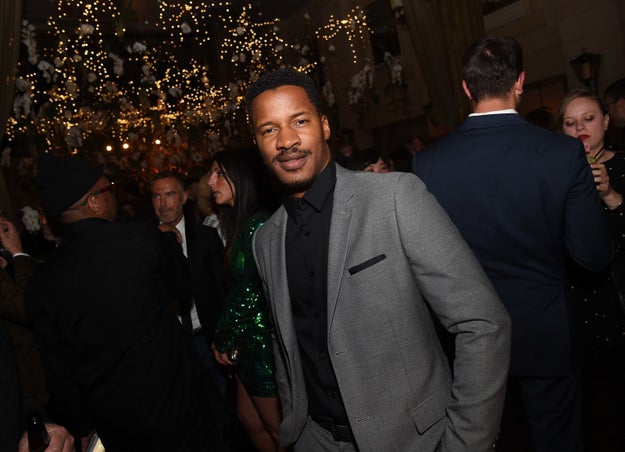
Nate Parker at the TIFF/InStyle/HFPA Party during the 2016 Toronto International Film Festival at Windsor Arms Hotel on Sept. 10. Kevin Winter / Getty Images
TORONTO — During a press conference for his film The Birth of a Nation at the Toronto International Film Festival on Sunday morning, actor, director, and screenwriter Nate Parker balked at the opportunity to address why he hasn’t apologized to the family of the woman who accused him of rape in 1999.
“A lot of people are having trouble separating the artist from the art,” New York Times reporter Cara Buckley posed during the presser, held at the Fairmont Royal York Hotel. “A lot of people felt you should have apologized for what happened 17 years ago to the victim and the family. Why haven’t you, and would you now?”
Parker responded by saying the press conference was not the appropriate “forum” for discussing the allegations and his personal history.
“I’ve addressed it a few times, I’m sure I’ll address it in different forums,” he said. “This is a forum for the film, this is a forum for the other people who are sitting on this stage. It’s not mine, I don’t own it. It does not belong to me. I definitely don’t want to hijack this with my personal life.”
The case against Parker and his friend Jean Celestin, who helped conceive The Birth of a Nation, made headlines when Parker did two interviews addressing the allegations in mid-August in an effort to gain control of the inevitable news. The interviews caused re-emergence of facts about the case, including that the accuser committed suicide in 2012. Parker was acquitted in 2001.
“I do want to make sure we’re honoring this film and these people in front of you,” Parker added at the TIFF press conference. “Respectfully, I would just like to… I want to say thank you again to the Toronto International Film Festival for allowing us to be here. I want to continue to celebrate the people that helped make this film possible.”
Prior to questions being opened up to attending media, the moderator of “The Birth of a Nation” panel, Cori Murray from Essence magazine, initially broached the topic of Parker’s rape allegations and the impact they may have on the film when it hits theaters on Oct. 7. Murray said it’s “not fair” for people to judge the film and noted the case’s closure.
“Unfortunately, now Birth of a Nation is shadowed with controversy, because now it’s taken Nate’s very personal story and made it very personal story to you,” she said, referring to the attending journalists. “…given your acquittal of sexual assault 17 years ago. Now what people are doing are judging the film before seeing it, which is not fair, because it’s still an important film. What do you now say to those people who have already made this choice and how do you motivate them to support it?”
Nate Parker said the words he’d repeat later, as above. “I’ve addressed it, and I’m sure in future forums I’ll address it more. The reality is that there’s no one person that makes a film. We’ve had more that 400 people involved in this project … I’m just a person.” He urged that the heart of the film was focused on making “honest conversation about race in this country,” and flagged that the film was a group effort, and that any success would be the group’s success.
“This isn’t the Nate Parker story, this is the Nat Turner story,” co-star Penelope Ann Miller added. She made note of the “powerful women” in the film. “It would be a shame if people didn’t get the opportunity to see this movie and judge for themselves and form their own personal opinions on where art is as actors… I hope that people will give this a chance.” She highlighted the enthusiastic response that The Birth of a Nation received Friday night during its first two screenings at TIFF: “That to us was a testament to the impact of the film when people see the film.”
Gabrielle Union was the first to use the words “sexual assault” in her response to what — and whom — the movie is for. “Yes we are addressing racial inequity… but that movement is inclusive. That movement includes the people who fight back against sexual violence.” She mentioned other “oppressive systems” including inadequate military veteran services, people dealing with mental health issues, trans violence, and early childhood education. “People are trying to legislate bathroom use; this movie is for you as well. So don’t think you are not part of this movement. There is a space and place for everyone. It’s going to be a lot of uncomfortable, awkward, heated conversations but that’s the only way we can hope to have evolution and hope to have behavioral shifts, which is what Nat Turner was all about.”
This story is developing.


